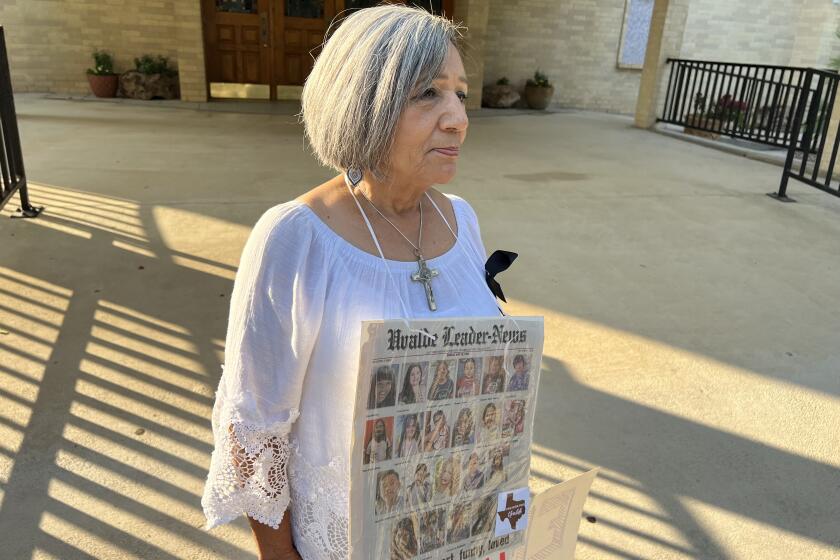Senators reach a bipartisan deal on gun safety

- Share via
WASHINGTON — A bipartisan group of senators on Sunday announced it had reached a framework for enacting modest gun restrictions, such as closing loopholes and increasing background checks for gun purchases by people between ages 18 and 21, in response to a recent spate of mass shootings that included a massacre at a Texas elementary school.
If enacted and signed by President Biden, the measure would become the most significant piece of firearms legislation produced by Congress in nearly three decades. The group of 20 senators, led by Christopher S. Murphy (D-Conn.) and John Cornyn (R-Texas), said it had struck a deal “to protect America’s children, keep our schools safe, and reduce the threat of violence across the country.”
Although the proposal falls far short of the gun safety reforms Biden has lobbied Congress to pass and is far less sweeping than the comprehensive package that advanced in the House last week, it garnered the immediate support of anti-gun groups and the White House.
The framework would create an enhanced review process for firearm purchasers under the age of 21, including a pause to conduct a background check. Senators working on the proposal have focused considerable attention on the 18- to 21-year-old population, particularly those who showed signs of violence or mental health struggles as a juvenile but are able to purchase a gun at age 18 because their juvenile records are sealed.
The plan would require a background check for such purchasers, including a pause if more time is needed for investigators to dig through records. The suspect in the recent mass shooting in Buffalo, N.Y., and the gunmen in the shootings in Uvalde, Texas, and Parkland, Fla., were between 18 and 19 years old.
Another significant provision of the deal includes closing the “boyfriend” loophole. It would prohibit anyone convicted of abuse against a spouse or domestic partner from buying a gun, a notable victory for activists against domestic violence.
The plan would also crack down on gun trafficking and straw purchases and create incentives for states to create “red flag” laws that would allow weapons to be temporarily taken away from people who show a risk of violence against themselves or others. And it would beef up school security and mental health programs.
“Families are scared, and it is our duty to come together and get something done that will help restore their sense of safety and security in their communities,” Murphy, Cornyn and 18 other senators said in a statement.
“Our plan increases needed mental health resources, improves school safety and support for students, and helps ensure dangerous criminals and those who are adjudicated as mentally ill can’t purchase weapons. Most importantly, our plan saves lives while also protecting the constitutional rights of law-abiding Americans.”
Murphy praised the deal as a break in a 30-year logjam on the gun issue on Capitol Hill and a sign Republicans and Democrats can work together on the issue.
Crucially, the agreement has the support of 10 Republican senators. If all 10 remain on board and join with all 50 members of the Democratic majority — including the two independents who caucus with them — the measure could overcome a filibuster.
The bipartisan group includes Murphy, Cornyn, Thom Tillis (R-N.C.), Kyrsten Sinema (D-Ariz.), Richard Blumenthal (D-Conn.), Roy Blunt (R-Mo.), Cory Booker (D-N.J.), Richard M. Burr (R-N.C.), Bill Cassidy (R-La.), Susan Collins (R-Maine), Chris Coons (D-Del.), Lindsey Graham (R-S.C.), Martin Heinrich (D-N.M.), Mark Kelly (D-Ariz.), Angus King (I-Maine), Joe Manchin III (D-W.Va.), Rob Portman (R-Ohio), Mitt Romney (R-Utah), Debbie Stabenow (D-Mich.) and Patrick J. Toomey (R-Pa.).
The group includes four Republican senators who are retiring this term — often a time when senators feel some relief from partisan political pressure — and others who have frequently touted the value of bipartisanship, such as Collins and Romney.
Notably, the deal was led on the GOP side by Cornyn, who is among a trio of senators interested in succeeding Senate Minority Leader Mitch McConnell when the Kentucky Republican steps down. Cornyn is a conservative from Texas, where the deal may be unpopular, but it may boost his deal-making bona fides.
The deal still has hurdles remaining before it can get to Biden’s desk. The agreement has to be turned into legislative text and get the support of 60 senators in a floor vote.
Other Senate Republicans were largely quiet Sunday or said they would review the framework before commenting, a potentially strong sign for the deal’s backers.
House Republicans were quicker to respond. Rep. Ronny Jackson (R-Texas) called it a “horrendous anti-2nd Amendment bill.”
“It’s AWFUL! This is a MASSIVE violation of your constitutional rights, and it MUST be rejected!,” Jackson wrote on Twitter.
Although Democrats have pressed for gun legislation in the aftermath of previous mass shootings, the slaughter last month of 19 fourth-graders and two teachers at an elementary school in Uvalde prompted a more focused response on Capitol Hill. Instead of demanding bans on assault rifles or other policies that would have prompted a rebuke from Republicans, Democrats opened the door to smaller-scale reforms. Republicans, jolted by the deaths in Uvalde, signaled they would come to the table.
Senate Majority Leader Charles E. Schumer (D-N.Y.) praised the agreement in a statement as “a good first step” for Congress to end “persistent inaction” on the nation’s gun violence epidemic.
“Once the text of this agreement is finalized, I will put this bill on the floor as soon as possible so that the Senate can act quickly to advance gun safety legislation,” said Schumer, who noted that Congress is poised “to take meaningful action to address gun violence” for the first time in nearly 30 years.
California shows that tough laws can successfully reduce firearm deaths.
McConnell issued similarly supportive remarks, a sign that it might not face enough Republican opposition to stall the measure.
“The principles they announced today show the value of dialogue and cooperation,” McConnell said.
Biden in a statement lamented that Congress had not done “everything that I think is needed” but nevertheless hailed the proposal, saying it would be “the most significant gun safety legislation to pass Congress in decades.”
“With bipartisan support, there are no excuses for delay, and no reason why it should not quickly move through the Senate and the House,” Biden said. “Each day that passes, more children are killed in this country: the sooner it comes to my desk, the sooner I can sign it, and the sooner we can use these measures to save lives.”
Brady, the anti-gun-violence group, also spoke positively about the deal, despite its shortcomings in the eyes of some progressives who want more aggressive action.
“This framework is laudable, but it is not the end of our effort,” said Brady President Kris Brown. “We will not rest until this framework becomes satisfactory legislation and President Biden signs that legislation into law.”
The National Rifle Assn. said it would withhold response until the full bill text is released. But the group’s Twitter account said it would “continue to oppose any effort to insert gun control policies, initiatives that override constitutional due process protections & efforts to deprive law-abiding citizens of their fundamental right to protect themselves/loved ones into this or any other legislation.”
More to Read
Get the L.A. Times Politics newsletter
Deeply reported insights into legislation, politics and policy from Sacramento, Washington and beyond. In your inbox three times per week.
You may occasionally receive promotional content from the Los Angeles Times.













